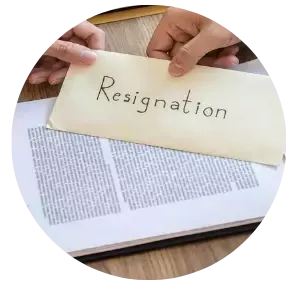When is it time to find a new job? Recognize the signs and quit in the best possible manner to set yourself up for success in the future.
Whether it’s for better growth opportunities, improved work-life balance, or escaping a toxic environment, knowing when it’s time to find a new job is never easy. But let’s face it, if you dread getting up in the morning or find yourself circling the block a few times before clocking in, it might be time to find a new job.
What may make it even more difficult is if you’ve only worked with your company for a few months and were hoping to finally add to your resume. The last thing you want is to be dissatisfied with your current job and have it also hinder your chances at future jobs.
We’ll explore the signs indicating it’s time for a change, how long you should stay at a new job before quitting, and the best way to give your resignation.
Signs It’s Time to Find a New Job
- Stagnation and Lack of Growth: You find yourself stuck in the same position without any prospects for advancement or skill development. It’s essential to keep growing both personally and professionally.
- Dread and Disinterest: If you dread going to work every day and feel a lack of passion for your role, it might be time to seek new challenges that reignite your enthusiasm.
- Negative Work Environment: Toxic colleagues or a hostile work environment can have a detrimental effect on your mental health and productivity.
- Unreasonable Workload and Stress: Constantly overwhelming workloads and stress can lead to burnout, affecting your overall well-being.
- Misalignment with Company Values: If your personal values and beliefs no longer align with your company’s culture, it may be time to explore opportunities elsewhere.
- Lack of Recognition and Appreciation: Feeling undervalued and underappreciated can impact your motivation and job satisfaction.
- Financial Instability: If the company is experiencing financial difficulties and layoffs are looming, it’s prudent to secure your future elsewhere.
- Changes in Circumstances: Life circumstances, such as a move to a new location, family changes, or health issues, might necessitate a change in employment.
- Lack of Recognition and Appreciation: Feeling undervalued or underappreciated for your contributions can lead to dissatisfaction and demotivation.
How Long Should You Wait Before Quitting?

Statistics indicate that roughly 30% of employees quit their jobs within the first 90 days. This high attrition rate is often attributed to factors such as job dissatisfaction, unmet expectations, poor fit, or the pursuit of better opportunities. The ideal tenure at a new job before considering quitting is generally considered to be at least one to two years.
Staying for this duration demonstrates commitment, allows you to gain substantial experience, and avoids the appearance of job-hopping on your resume. However, if you face unbearable circumstances or the company is undergoing significant changes that adversely affect your role, it may be justified to leave earlier.
Will Quitting Too Soon Hurt Your Resume?

Leaving a job too soon can raise concerns for potential employers who may question your commitment and reliability. They may see you as a job hopper and a potential risk of not staying at your new job for too long. If you have a legitimate reason for leaving early, such as relocation, personal reasons, or a better opportunity, it’s essential to address these reasons honestly during interviews.
Additionally, showcasing any accomplishments and skills gained during your short tenure and your ambition to seek new opportunities can help overlook your decision to leave. Have a good reason for leaving early besides you just didn’t like it or had issues.
Should You Give A 2-Weeks Notice?

Providing a two-week notice is a professional courtesy that allows your employer to make arrangements for your departure and initiate the hiring process for your replacement. It reflects positively on your character and can preserve a good relationship with your current employer, which might be valuable for future references.
There is no law that states you must put in a 2-weeks notice but it’s best to do, especially if you have built good relationships. You don’t want to burden your former co-workers with your unexpected absence for burn any unnecessary bridges.
How to Resign: In Person, Text, or Email?

Resigning in person is the most respectful and appropriate approach, especially if you have a good relationship with your supervisor. It allows for open communication and ensures you leave on a positive note. However, if in-person resignation is not feasible due to remote work or other circumstances, a professionally crafted email would be the next best option. Avoid resigning via text, as it can be seen as unprofessional and disrespectful unless working in a casual work environment.
Ensure a Smooth Transition

Before quitting your job, it’s crucial to have another job lined up or a considerable amount of savings to act as a cushion during the transition period. It is generally recommended to have an emergency fund that covers 3 to 6 months worth of living expenses. This will help you manage your financial responsibilities and reduce the pressure to accept the first job offer that comes your way. Additionally, network with industry contacts, update your resume and LinkedIn profile, and prepare for interviews to expedite the job search process.
Related: What Is A Passport Bro and Should You Be One?
Wrap Up
Knowing when is it time to find a new job is vital for your career growth and well-being and sanity. By understanding the signs indicating the need for change, considering the appropriate timing, and handling the resignation process professionally, you can navigate this crucial phase with confidence. Remember, a smooth transition can lead to awesome opportunities and a more fulfilling career path.
Also Read:




